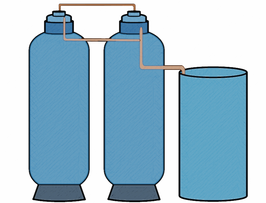Reduce Hardness with a Water Softener
About Water Softeners
Hard water is not a serious health concern - but it is a nuisance that can be controlled. Hard water can cause scale buildup on fixtures and surfaces, shorten the lifespan of appliances, and reduce the efficiency of soaps and detergents. Use of water softeners are common interventions to reduce the hardness levels of water.
Hard water is not a serious health concern - but it is a nuisance that can be controlled. Hard water can cause scale buildup on fixtures and surfaces, shorten the lifespan of appliances, and reduce the efficiency of soaps and detergents. Use of water softeners are common interventions to reduce the hardness levels of water.

Water softeners are a point-of-entry (POE) type of treatment. This means the water is conditioned as it enters the home, providing soft water at all faucets, shower heads, and water-using appliances. Household water softeners use ion exchange to replace hardness-causing ions (e.g., calcium, magnesium) with non-hardness ions (e.g., sodium chloride). Some can be designed to remove positive and/or negative charged contaminants, such as: iron and manganese, heavy metals, some radioactive compounds, nitrates, arsenic, chromium, selenium, and sulfate.
PRO TIP: When searching the market for a water softener, be sure to look for those that are certified to NSF/ANSI 44. Certification ensures that the device is made from safe materials and the contaminant reduction claims listed on the packaging are verified by independent lab testing.
PRO TIP: When searching the market for a water softener, be sure to look for those that are certified to NSF/ANSI 44. Certification ensures that the device is made from safe materials and the contaminant reduction claims listed on the packaging are verified by independent lab testing.
|
Benefits
|
Limitations
|
Other Resources
- WQRF Softened Water Benefits Studies - Executive Summary l Two-page Summary of the studies
- Softeners and Septic Systems, a WQRF Study: [Link to Summary]
- CDC - A Guide to Drinking Water Treatment Technologies for Household Use [Link]
- University of Nebraska–Lincoln - Drinking Water Treatment: Water Softening (Ion Exchange) [Link]



